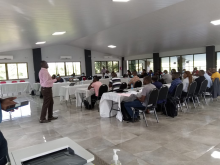CIDRZ supports the National HIV Differentiated Service Delivery Training of Trainers under the Global Fund Differentiated Service Delivery Strategic Initiative
The Global Fund Differentiated Services Delivery (DSD) Strategic Initiatives (SI) invest in technical assistance (TA) in ten (10) priority countries until 2023, for the adoption of World Health Organization (WHO) recommended guidance, to incentivize increased program quality and efficiency along the HIV testing, treatment and advanced disease cascade, through promotion of best-practices and acceleration of country grant implementation. It leverages technical assistance from local and international TA providers, as well as global partners as WHO, for the expansion of differentiated testing and treatment models, advanced HIV disease management and virtual interventions across the HIV cascade.
The Zambian Government is one of the DSD SI priority countries and has designed a workplan that complements country efforts to improve men’s access and retention in HIV services through the implementation of differentiated testing, treatment, advanced HIV disease and digital interventions with the Centre for Infectious Disease Research in Zambia (CIDRZ) providing local technical assistance and ICAP providing international technical assistance.
The 2016 Zambia Population-Based HIV Impact Assessment (ZAMPHIA) data showed that 67.3% of people living with HIV (PLHIV) in Zambia between 15-59 years knew their HIV status and antiretroviral treatment (ART) coverage of 53.6% amongst men was like that of women at 57.6%. ZAMPHIA data also revealed significant age and gender gaps in HIV testing, knowledge of HIV status and linkage to treatment; with the higher unmet need for testing noted in males between the age groups of 15 – 24 and an ART coverage gap amongst men aged > 15 years of 195,405 compared to women of the same age group with a gap of 131,737. Zambia has made great progress in scaling-up ART towards the 95:95:95 goals among PLHIV.
Providing male friendly services is an important step in trying to reach more men and increase the chances of increasing their access and retention in HIV care and treatment services. In alignment with the Zambian broader national strategic plan to address these gaps, Zambia’s Government developed a focused DSD Strategic Initiative plan that aims to contribute to the country’s efforts to increase the proportion of men who know their HIV status and retain men living with HIV on treatment, through specific DSD models targeted at men i.e. the Men’s Clinic and Community Post models. Capacity building is an important component of health system’s strengthening, that aims to ensure that health-care providers demonstrate the technical competence required to provide quality health services. The Zambia DSD SI plan includes improving human resources DSD skills and knowledge with focus on health care provider’s capacity building, starting with provincial level. Provincial trainers will further cascade the training to districts and facility level health care providers for effective DSD implementation.
The Centre for Infectious Disease Research in Zambia supported the Ministry of Health (MoH) to update and conduct the National Differentiated Service Delivery Trainer of Trainers (TOT) from 28th March to 1st April 2022 through the DSD SI funding from the Global Fund. The training of trainers serves as a cornerstone for successful implementation of the national DSD training plan, by providing a strong foundation for provincial teams to plan, implement and monitor DSD models according to national guidance. The goal of the training is to enable the participants to demonstrate an understanding of the DSD training package and acquire the necessary knowledge and skills to train districts health care providers for effective implementation of DSD models at facility and community levels. Listed below are the main training objectives:
a) To describe the different types of DSD models to be implemented and scaled-up in the country
b) To discuss the benefits and the process of the various DSD models
c) To outline the monitoring and evaluation process associated with DSD models
d) To understand the importance of commodity and supply chain management for DSD implementation and sustainability.
Through this training of trainers, capacity has been built in five provinces namely, Southern, Lusaka, Muchinga, Copperbelt, and North-Western provinces. The training included 34 participants (20 health care workers from provincial health offices, 14 participants from partner organisations and civil society). Four participants were drawn from each participating province, consisting of Provincial HIV program lead, Strategic Information Officers, Supply chain focal point persons and Community focal point person.
In his keynote speech, Acting National DSD Coordinator Dr Khozya Zyambo said, for the Ministry of Health, this programme has been timely, in that it has brought together the health care workers that are attending to people who are living with HIV within the provinces.” He noted that Differentiated Service Delivery of HIV services is one of the Ministry’s top agenda for offering Person Centred Care. “We feel bringing together such a team of people will indeed build capacity in terms of improving the quality of care we are offering to people living with HIV. For the Ministry, this training has been a great undertaking, we really appreciate the national trainers that were involved. We look forward to the people that have participated to go and deploy everything that they have learnt in building capacity amongst the other Health workers that have not yet undergone this Training,” said Dr Zyambo.
In his remarks, CIDRZ - DSD Technical Advisor and Service Delivery and Trainings lead on the DSD taskforce Mr Muhau Mubiana, noted that the training is another milestone in achieving the goals of the DSD Task Force for strong coordination among stakeholders involved in DSD implementation. “I am happy that a key milestone has been achieved in line with the national DSD implementation plan, i.e., to build capacity from the provinces down to the lower levels,” said Mr Mubiana.
Mr Edger Chisuwo, one of the training participants from Sothern Provincial Health Office noted that the training gave him the capacity to gain more knowledge in different DSD models and deep understanding on how these models can be applied to improve client centered care and health systems strengthening. “Tell me and I forget, teach me and I may remember, involve me and I learn, in learning you will teach, and in teaching you will learn.” This is my feeling and view on the just ended DSD TOT training,” said Mr Chisuwo. Mr Chisuwo recommended that the training package be rolled out to all Health Care Workers for the benefit of the clients and the Ministry of Health.
Following this first TOT round, the MoH with it’s implementing partners under the national DSD taskforce will support cascading of trainings to districts and facilities, to meet national DSD training planning goals for 2022. Furthermore, the DSD taskforce will also conduct a second TOT round to the remaining five (5) provinces by June 2022 targeting the provincial staff and their supporting implementing partners.
Communications Officer
World Health Organization Country Office, Zambia
Email: kapemak [at] who.int (kapemak[at]who[dot]int)

